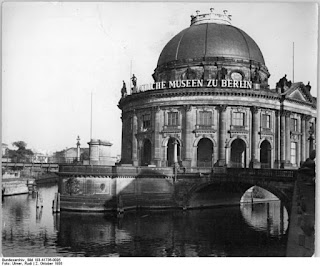Berlin, Museuminsel, 1956. Bundesarchiv, Bild 183-41736-0005 / CC-BY-SA
It's perhaps two or three years since I started reading Adam Zagajewski's work. He is originally from Lwów in Poland, which inspired one of his most beautiful poems, 'To Go To Lvov'. From a country and a generation which produced many remarkable poets, he is outstanding.
I am distantly fascinated by Poland. So far I have only visited Krakow for a weekend, but it did not disappoint me. Among its other mysteries, the city carried faint echoes of the weeks I spent every summer in Finland as a child. I suppose this is some Baltic commonality, something in the air. I really love what I have read of Polish literature. The Poles seem to be both philosophical and passionate, which appeals to me a good deal. I remember years ago in Dublin, when I and a friend met some Polish sailors on board their ship in the docklands. I mentioned that I loved Joseph Conrad, although our conversation was mainly about the Bible. When we took our leave, one of the sailors kissed my hand.
VITA CONTEMPLATIVA (Adam Zagajewski)
The narrator of this poem is in Berlin, reflecting on the quiet moment in history where he seems to find himself. I have also been to Berlin; "dark waters" and "black buildings", indeed. I suppose that the references to Greek statuary are from the Pergamon Museum. Zagajewski, or his narrator, says with what seems to me some irony, "So this is the vita contemplativa...So this is it." Like philosophers before him, he contrasts the contemplative life with the active life, and obviously doesn't find peace. The contrast between "tranquility" and "taut attention" suggests that he knows this is just a suspended moment in time. After all, how often and for how long has peace reigned in Europe, or in the world of humans?
I'm haunted by the final line of 'Vita Contemplativa': "We dwell in the abyss. In dark waters. In brightness." There is no one who can fail to find something resonant in those words, in their life.

This comment has been removed by the author.
ReplyDeleteI feel the final line as decisive in a poem and beyond a shadow of a doubt this is a brilliant final line. But, from my point of view, when referring to tranquility, taut attention, contemplative life he's talking about the poetic sight on reality.
ReplyDeleteEurope inclined to dark waters, to dweel in the abyss, to bleak prospects, fond of going down in the drawbacks, resistant to showing enthusiasm for the their achievements; always needing some quiet moments and a more optimistic outlook. Poetry has a role to play in this vision, politicians can't do it by themselves.
Thank you for commenting. I think you make a great point about the perspective on Europe in this poem; perhaps it's also more evident to us at this moment in time because of current uncertainties and instability. There is an ambiguity to the poem which I find powerful as well: for instance, when the "diplomats doze", it could be because there's peace and they don't have a lot to do - or it could be because they have utterly lost sight of reality.
Delete